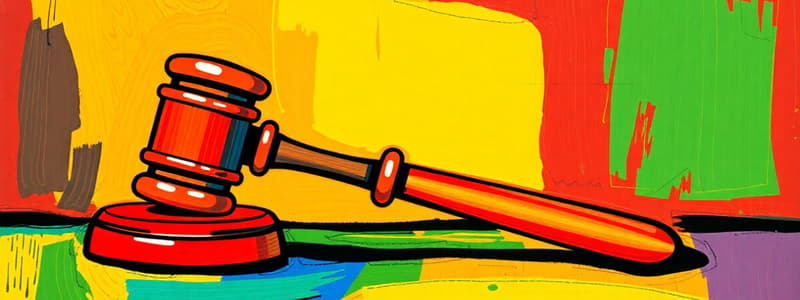Podcast
Questions and Answers
Republic Act No. 7394 is also known as the Consumer Act of the Philippines.
Republic Act No. 7394 is also known as the Consumer Act of the Philippines.
True (A)
The Consumer Act of the Philippines was enacted on January 1, 1990.
The Consumer Act of the Philippines was enacted on January 1, 1990.
False (B)
Manufacturers are not required to label their products under the Consumer Act.
Manufacturers are not required to label their products under the Consumer Act.
False (B)
Consumers have the right to seek redress for deceptive sales practices according to the law.
Consumers have the right to seek redress for deceptive sales practices according to the law.
The Department of Trade and Industry oversees the regulation of food and drugs.
The Department of Trade and Industry oversees the regulation of food and drugs.
The Consumer Act includes provisions for consumer education and information.
The Consumer Act includes provisions for consumer education and information.
Only sellers, not manufacturers, can be held liable for damages caused by defective products.
Only sellers, not manufacturers, can be held liable for damages caused by defective products.
The Consumer Act prohibits unfair lending practices in consumer credit transactions.
The Consumer Act prohibits unfair lending practices in consumer credit transactions.
The Department of Trade and Industry (DTI) is one of the agencies responsible for consumer protection enforcement.
The Department of Trade and Industry (DTI) is one of the agencies responsible for consumer protection enforcement.
The Right to Redress allows consumers to receive compensation for defective goods.
The Right to Redress allows consumers to receive compensation for defective goods.
The Right to Representation ensures that only manufacturers have a say in government policies.
The Right to Representation ensures that only manufacturers have a say in government policies.
Bangko Sentral ng Pilipinas (BSP) is responsible for enforcing consumer rights related to health and safety.
Bangko Sentral ng Pilipinas (BSP) is responsible for enforcing consumer rights related to health and safety.
Consumers have the right to choose from a limited selection of products and services.
Consumers have the right to choose from a limited selection of products and services.
Flashcards are hidden until you start studying
Study Notes
Consumer Act of the Philippines (RA 7394)
- Enacted in 1992, the Consumer Act of the Philippines (RA 7394) protects consumer interests and promotes their welfare.
- Establishes standards for trade and commerce, serving as the primary legal framework for consumer protection in the Philippines.
Consumer Product Quality and Safety
- Requires manufacturers to provide clear and accurate product information to allow informed consumer choices.
- Government can establish safety regulations and recall unsafe products.
Deceptive and Unfair Sales Practices
- Prohibits misleading, or deceptive sales practices to protect consumers.
- Sellers engaging in these practices face penalties.
Liability for Products and Services
- Manufacturers, distributors, and sellers are accountable for damages caused by defective products or inadequate services.
- Consumers have the right to demand compensation for injuries or damages.
Consumer Credit Transactions
- Regulates interest rates and fees in credit transactions, ensuring transparency and fairness.
- Safeguards against over-borrowing and unfair lending practices.
Regulation of Consumer Products and Services
- The Department of Health (DOH) regulates food, drugs, cosmetics, and hazardous substances.
- The Department of Trade and Industry (DTI) oversees non-health-related consumer products.
Consumer Education and Information
- Mandates government initiatives to educate consumers about their rights and responsibilities.
- Promotes consumer education programs to raise awareness about product quality, safety, and responsible consumption.
Consumer Complaints and Resolution
- Provides a framework for filing and resolving consumer complaints.
- Consumers can file complaints with agencies like the DTI, DOH, or local government units for mediation and resolution.
Enforcement Agencies
- Department of Trade and Industry (DTI)
- Department of Health (DOH)
- Bangko Sentral ng Pilipinas (BSP) (for credit-related matters)
- Local Government Units (LGUs)
Consumer Rights under RA 7394
- Right to Basic Needs: Access to essential goods and services.
- Right to Safety: Protection against hazardous products.
- Right to Information: Informed decision-making through product and service information.
- Right to Choose: Variety of products and services at competitive prices.
- Right to Representation: Voice consumer interests in government policy formulation.
- Right to Redress: Compensation for misrepresentation, defective goods, or unsatisfactory services.
- Right to Consumer Education: Knowledge and skills for informed consumer decisions.
- Right to a Healthy Environment: Live and work in a non-harmful environment.
Studying That Suits You
Use AI to generate personalized quizzes and flashcards to suit your learning preferences.





